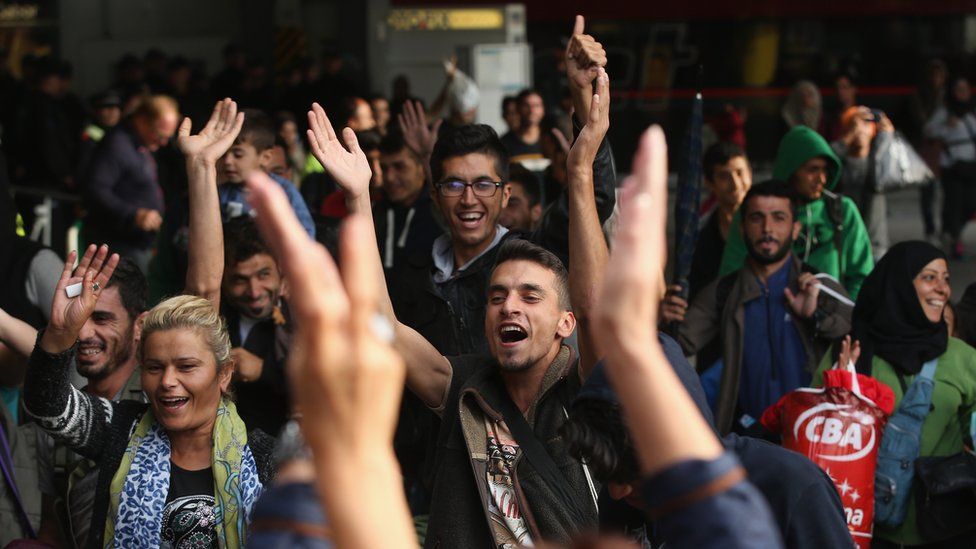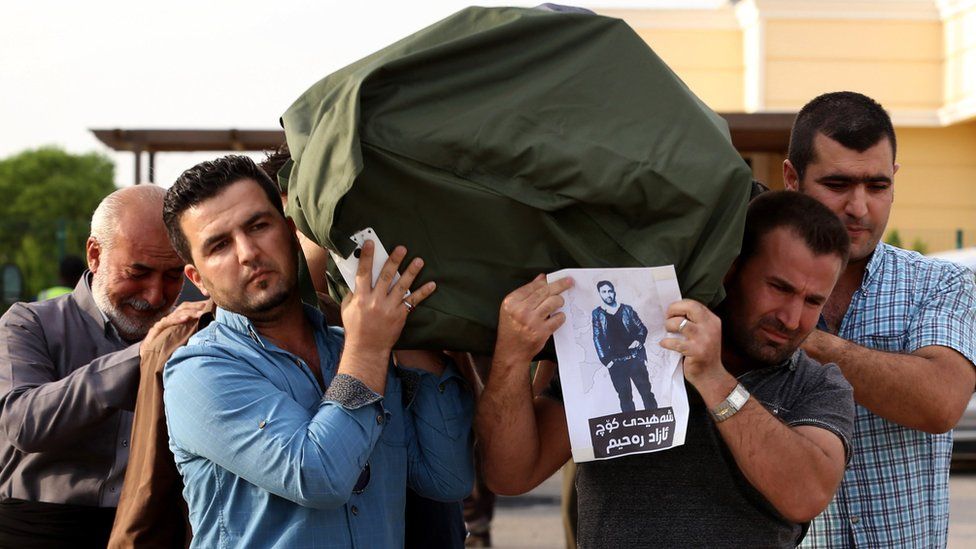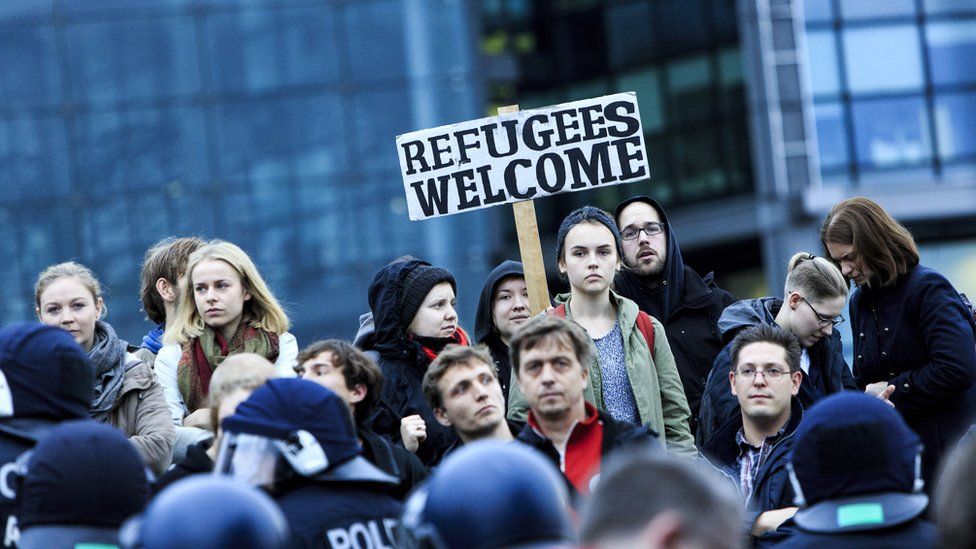Five years ago, more than one million people crossed into Europe. Many of them took huge risks and embarked on dangerous journeys in an effort to escape conflict and find a better life.
But the sudden influx of people sparked a crisis - both humanitarian and political - as Europe struggled to respond. Thousands died attempting to reach its shores and, while some countries opened their arms, others erected fences and closed their borders.
The impact of this mass migration is still being felt today. Here, BBC correspondents, experts and those who made the journey themselves reflect on that dramatic time. How did it change Europe and the lives of those involved?

How it began: 'I knew we had no future'
Lara Tahan, Syrian teacher: My life before the war in 2011 was very good. I was a maths teacher in Aleppo with two children. But as the war started, I knew we had no future in the country. I used to drive to work and see bodies on the side of the road. So I fled to Turkey - it was the easiest option back then.
Mark Lowen, Turkey correspondent 2014-19: Syria's war shot Turkey to the front of the migration story. It borders Greece and Bulgaria, so in many ways it became the EU's waiting room. There was a huge flow of people from Syria to Turkey and then on to Greece in 2015.
Julian Miglierini, BBC reporter in Rome: But in Italy, migration had been a big issue for years. Its closeness to North Africa made it a prime destination for those willing to risk crossing the Mediterranean, and many people did.
Guy De Launey, Balkans correspondent: That summer in Serbia it was common to see people on the streets who had travelled from the Middle East. They were taking the Balkan route - which wound north through Greece and North Macedonia on the path towards countries like Germany.
Lara Tahan, Syrian teacher: My two sisters already lived in Germany. I realised that Turkey was not the future I was looking for for me and my little kids, so I decided to travel there to find better opportunities.
Jenny Hill, Berlin correspondent: Germany had been taking in people fleeing war and persecution and it had a reputation as a welcoming country. But when thousands of people arrived at the start of September 2015, a crowd was there to meet them with hand-painted signs and gifts for the exhausted people coming off the trains. They broke into spontaneous applause and cheering - it was an extraordinary moment.

Lara Tahan, Syrian teacher: I arrived in Munich after a long and complicated journey. It was raining cats and dogs! For me that was the first strange thing I noticed... rain in the summer! But I met very nice people who were so open to the refugees.
Maddy Savage, Sweden correspondent: Similarly, in Sweden, the mood at the time was that this was one of the most welcoming countries anywhere. At stations there were people with banners saying "refugees welcome", and a year earlier the prime minister had given a speech asking Swedes to open their hearts to migrants.
Samar Jaber, engineering graduate from Jordan: At university they would always talk about how Sweden was welcoming to refugees, so I fled Jordan. I had no choice because my life was in danger. My sister was already in Sweden and we were eventually reunited. When I arrived I thought I was finally free.

Europe responds: 'We will manage it'
Guy De Launey, Balkans correspondent: The big shift came when police in North Macedonia fired teargas at people trying to cross the border with Greece. The authorities said they were overwhelmed. It seemed like Europe had suddenly become keenly aware of a problem that had been hiding in plain sight.
Nick Thorpe, Central Europe correspondent: And in Hungary the government announced it would erect a fence on its border. Police also sealed off the main railway station in Budapest to stop people travelling further. But the measures just forced people into the hands of smugglers and illegality.
Bethany Bell, Austria correspondent: The dead bodies of dozens of migrants were later discovered in the back of a lorry that had travelled from Hungary into Austria. It was a shocking moment that highlighted the issue of people smuggling and the desperation of those caught up in the crisis.
Jenny Hill, Berlin correspondent: Angela Merkel, like all of us, was horrified by the lorry discovery. It seemed to have a profound impact on her. Just days later she said at least 800,000 people would likely seek asylum in Germany that year. And for the first time she used what would become her catchphrase: "wir schaffen das" - we will manage it.

Nick Thorpe, Central Europe correspondent: Merkel, in agreement with the Austrian chancellor, agreed to take in those who were left stuck in Hungary. Thousands gave up on Budapest station and marched to Vienna. Hungary's view was essentially: 'If you want these people, you can have them'.
Lara Tahan, Syrian teacher: After I arrived in Munich, I went to two refugee camps before I was moved to a small town in Hessen. We met Germans who wanted to get in contact with refugees and help us integrate. They've been very supportive to me at every stage and I still live there now.
Jenny Hill, Berlin correspondent: Germany's approach was to try to ensure that new arrivals were housed all over the country; that no one area should be disproportionately affected. In reality, it became the job of local mayors and authorities to sort the logistics. But they were supported by a remarkable volunteer movement.
Maddy Savage, Sweden correspondent: Migrant families in Sweden often ended up in remote locations, or in temporary accommodation moving from place to place. And while openness to the new arrivals was the norm, that began to shift as the strain on resources became more apparent.
Guy De Launey, Balkans correspondent: Eventually, the Balkan Route was declared closed in March 2016. That helped to reduce the flow of people.
Mark Lowen, Turkey correspondent 2014-19: And a deal struck between the EU and Turkey a few weeks later proved remarkably effective. It stated that Turkey would be given billions in EU aid for agreeing to take back Syrian refugees who arrived on Greek islands. It led to a massive decline in numbers.

Work and housing: 'They thought it would be paradise'
Samar Jaber, engineering graduate from Jordan: Sweden was very hard at first and people tried to take advantage of me before I was granted refugee status. I have legal status now, and I want to use my degree, but I've come to realise they don't accept foreign qualifications here.
Maddy Savage, Sweden correspondent: A lot of people thought Sweden would be paradise but the reality has delivered more challenges than they might have expected. Even highly educated migrants with great English have struggled to progress because their qualifications are invalid.

Samar Jaber, engineering graduate from Jordan: I've applied for about 100 jobs and have never been invited to interview. So now I've decided to do what they want and I'm studying for a Swedish diploma. I want to build a future, I want to be independent, but it's been six years and I don't have anything.
Maddy Savage, Sweden correspondent: Housing and employment have been two of the biggest issues. Sweden has a huge squeeze on accommodation in major cities. Unless you've been in a queue for social housing for years you're reliant on connections.
Jenny Phillimore, professor of migration: One legacy of 2015 is the innovative ways people have addressed issues like housing. In Hamburg and Bremen they actually turned shipping containers into homes for migrants. In Amsterdam, they built a similar "container city" that housed 50% young Dutch people and 50% refugees. But there are still issues.
Maddy Savage, Sweden correspondent: The unemployment rate for foreign-born citizens is 21.2% vs. 5.5% for those born here. The aim is for new arrivals not to be doing black market jobs, and there has been a debate about whether there should be looser rules that would allow them to work more easily.
Samar Jaber, Engineering graduate from Jordan: You cannot feel stable. It feels like every time I do something I get asked for another thing! Do you think I want to stay at home and not work? We all want to work. But there's nothing.
Jenny Hill, Berlin correspondent: Germany has an ageing population and the new arrivals were seen by some as an answer to a shortage of skilled workers - big companies like Siemens started to offer apprenticeships. But inevitably there were problems and the migration issue dominated society for several years.

Political fallout: 'Compassion fatigue has taken root'
Jenny Hill, Berlin correspondent: Crimes committed by asylum seekers dominated headlines. The attacks on young women in Cologne on New Year's Eve 2015 at the hands of men who came - in the main - from North Africa fuelled anger as did the terror attack on a Berlin Christmas market, perpetrated by a Tunisian man who had come to Europe as an asylum seeker.
Maddy Savage, Sweden correspondent: Crime has become part of the immigration debate here, too. There have been high-profile incidents, but police will tell you that crime in certain high-immigration areas is largely not from recent arrivals but from criminal networks and gangs.
Jenny Hill, Berlin correspondent: There was a backlash against Merkel's "we can manage" policies, and she soon dropped the slogan as support for the anti-migrant Alternative for Germany (AfD) party grew. "Flüchtlingspolitik" (refugee politics) polarised society.

Julian Miglierini, BBC reporter in Rome: In Italy, nationalists exploited a perceived lack of co-operation from the EU and fellow European countries during the crisis. They've expressed anti-migrant sentiments and the message has clicked with many Italians. Nationalists have certainly had electoral success here since.
Daphne Halikiopoulou, professor of European politics: The trend we've seen in Europe, starting from the economic crisis and then continuing with the migrant crisis, is the shrinking of the mainstream and the rise of nationalist policies.
Maddy Savage, Sweden correspondent: The nationalist Sweden Democrats have got more attention here since the crisis and have gained in popularity. It's become more acceptable to voice anti-immigration views, and a cap on numbers has been introduced and even adopted as a policy by the centre-left.
Bethany Bell, Austria correspondent: The crisis has brought about significant change in Austrian politics. Opposing immigration has been a huge theme for Chancellor Sebastian Kurz. His anti-migrant message helped him win two elections and take votes away from the far-right. It's still a dominant issue for his conservative party.
Daphne Halikiopoulou, professor of European politics: The actual immigration numbers often don't correspond with people voting for a particular party. What's more important is how voters perceive the crisis and how it's portrayed. In this way, parties have been able to influence mainstream politics in a way that they weren't before.
Guy De Launey, Balkans correspondent: Some nationalist politicians have attempted to use the crisis to stir up support. In general, sympathy for the plight of those coming up the Balkan Route appears to have declined. People are protesting against asylum centres and compassion fatigue has taken root.
Nick Thorpe, Central Europe correspondent: And in Hungary the conservative Fidesz government has used the crisis to bolster its own support. This, combined with an economic boom, made them unbeatable in 2018.
Daphne Halikiopoulou, Professor of European politics: We can understand the impact of the migrant crisis mostly in terms of the opportunity it presented to [nationalist] parties to increase their support. And I think we'll continue to see these parties becoming more embedded in the political mainstream.

Schools and integration: 'I want to build a life here'
Jenny Phillimore, professor of migration: In places like Sweden and Germany, which saw the largest number of arrivals, they were faced with a less orderly approach to addressing integration. But there was a huge, grassroots volunteering effort, which was one of the most positive things to come out of the situation.
Maddy Savage, Sweden correspondent: But it's still difficult for immigrants to climb the ladder. Sooner rather than later we might see how things pan out for the children who came here and are approaching the age where they'll enter the job market.
Jenny Phillimore, professor of migration: That will be the moment when Sweden knows whether its response has been a success or not. It has an ageing population, so to suddenly receive an injection of 40,000 young and able people could prove a major success.
Latest Stories
-
Fire guts Kwadaso Wood market in Kumasi
3 hours -
GPL 2024/25: Gold Stars revive title hopes with win over Berekum Chelsea
4 hours -
We won’t entertain arrogant appointees – Deputy NDC Youth organizer warns
6 hours -
Akufo-Addo’s Aide-De-Camp in good shape after collapsing in Parliament
6 hours -
NPP notifies Parliament of its selected leaders for the 9th parliament
6 hours -
Dumelo loses father days before his swearing in as MP
7 hours -
NPP’s Mandamus Application: This is how the High Court ruled on 4 disputed constituencies
8 hours -
‘Forty Weeks and More’ premieres Jan. 18 on Joy Prime
8 hours -
GHANET urges caution against HIV during the new year festivities
8 hours -
High Court in Accra orders EC to re-collate results for Techiman South
9 hours -
NDC files notice of appeal after High Court ordered completion of results collation in 4 constituencies
9 hours -
2024 Election: South Tongu MP-elect gave Mahama the highest percentage of votes
10 hours -
Daily Insights for CEOs: Mastering time management as a CEO
10 hours -
Kantamanto Market fire: Strengthen investigations or expect more fire – Dwamena-Aboagye
10 hours -
Belgian Foreign Minister to lead EU delegation to John Mahama’s inauguration
10 hours
